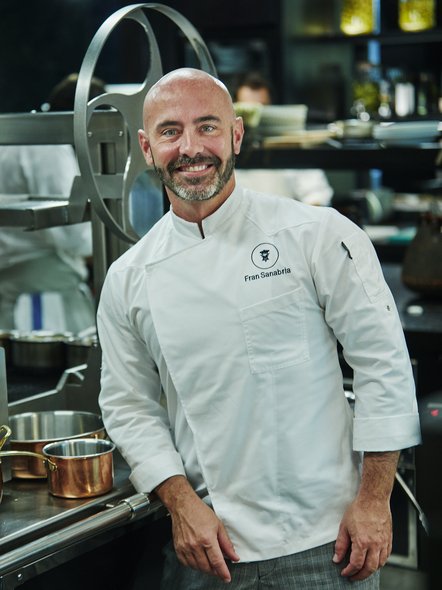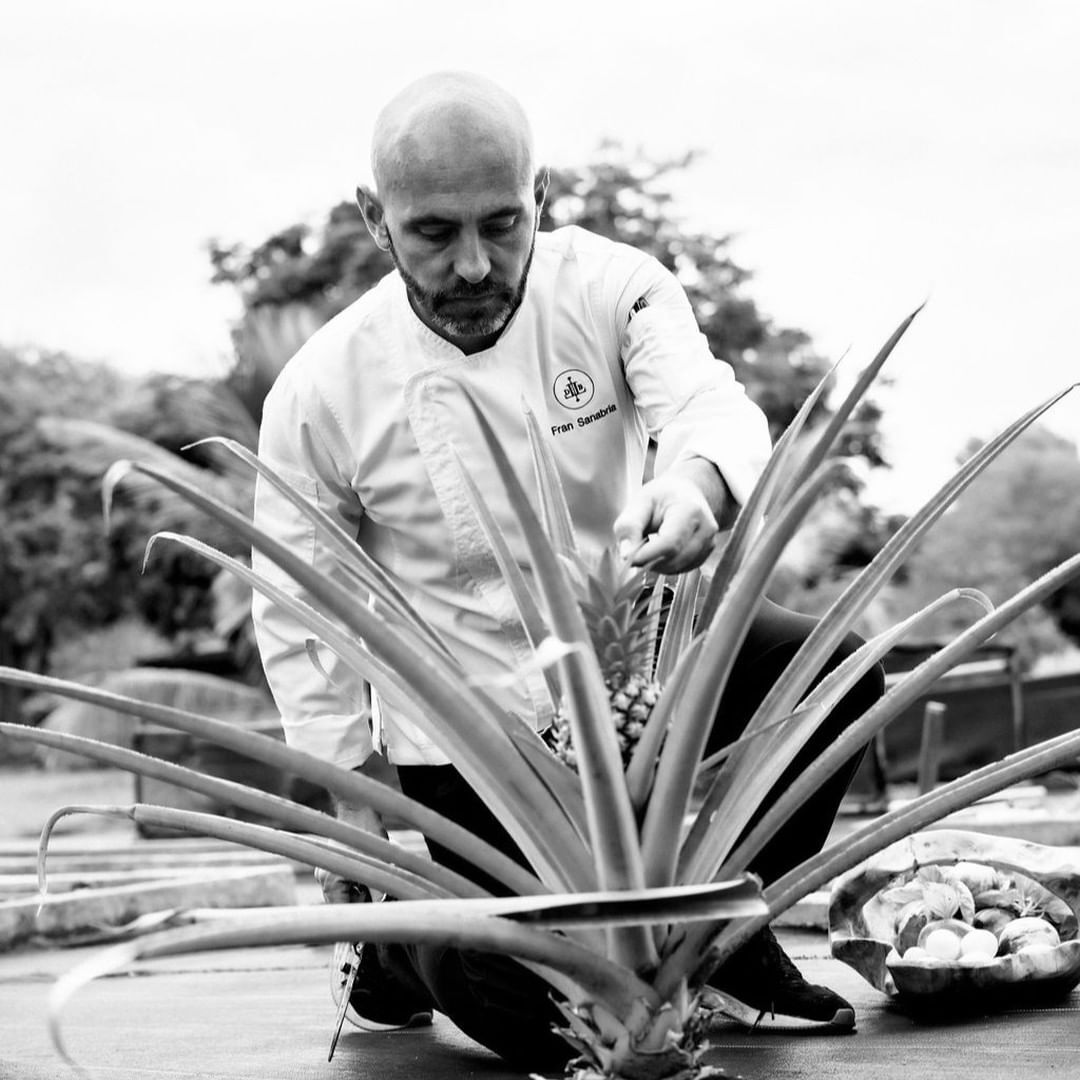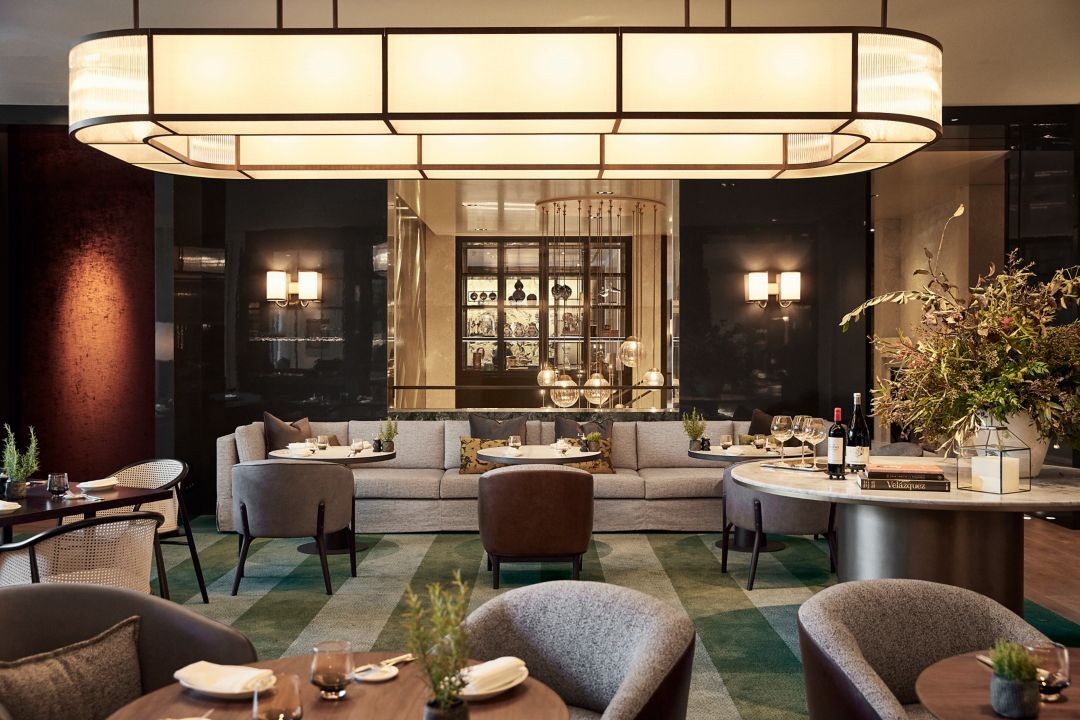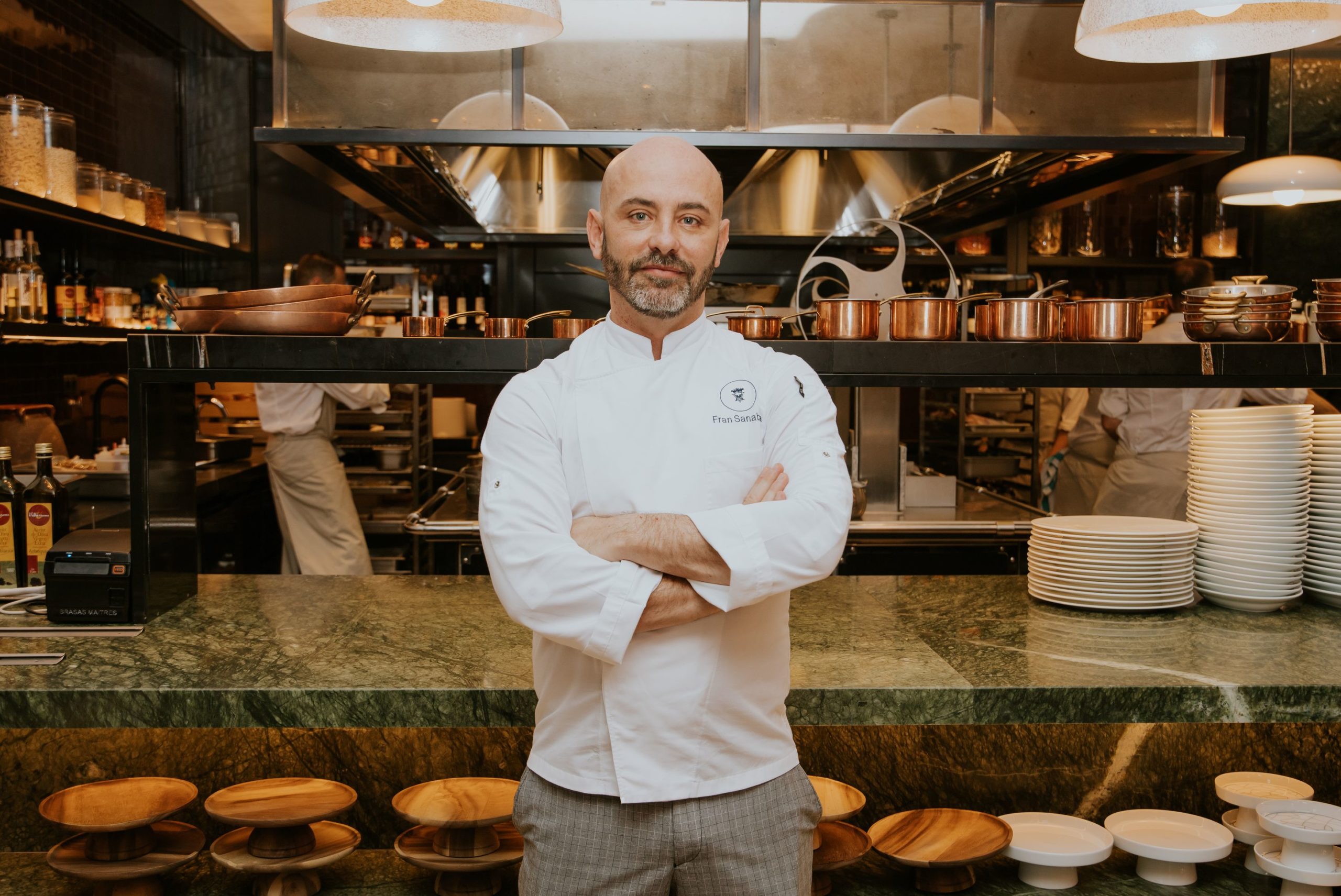The global hospitality industry is constantly growing and changing, connecting workers from all continents and offering new career opportunities and experiences.
Global tourism is on track to return to pre-pandemic levels. From the increase in international travel to the growing demand for luxury accommodation, our sector is returning to its apex, generating new entries and opportunities.
Many professionals want to go into international hospitality, take the leap and start travelling, but it's not always easy to make the decision to leave one's comfort zone.
Francisco Sanabria, Executive Chef at Rosewood Villa Magna Madrid, tells us his story as a traveller and haute cuisine expert, so that professionals around the world can follow in his footsteps and venture into the world of international hospitality and haute cuisine.
Tell us your story: what made you decide to dedicate your career to fine dining?
I come from Cáceres, a small town in the west of Spain, from a family with a law tradition. I studied law for 3 years until I decided that it wasn't my thing and that I needed a change of scenery.
I had my life more or less planned out, until I realised that I was more focused on cooking for my family and friends than on the exams I had.

I think it was a wake up call. Here at Rosewood we call it "the calling", that's how we refer to this vocation.
I left my comfortable little nest in Cácéres and went to Santiago de Compostela, to train at the CSHG (Centro Superior de Hostelería de Galicia). Then I went to work in Madrid for two years, and from there I spent 14 years in Barcelona, working at Sant Pau, Carmen Ruscalleda's three Michelin star restaurant.
During that time Ruscalleda opened the Sant Pau Tokyo restaurant in Tokyo and the Monuments restaurant at the Mandarin Oriental hotel in Barcelona. That’s when I started to oversee all three, travelling constantly between Tokyo and Barcelona.
There was a moment when I wanted to return to my family, but life had other plans: I had an opportunity to work for the opening of the Rosewood Hotel in Abu Dhabi, where I stayed for 4 years. From there I moved on to the Hotel that opened in the Bahamas, and after two years I went to the Virgin Islands to open another Rosewood hotel, the Little Dix, where I stayed for 3 and a half years, until the company opened the Villa Magna Hotel in Madrid.
After 20 years travelling the world it was time to come back home.
Nowadays, many people lose motivation and move away from the hospitality industry. How did you manage to keep your passion for this job alive?
My love for cooking is a fundamental part of it and remains at the heart of my day-to-day life. But once you start to travel, your mind opens up to new horizons and this creates that added factor.
This is not intrinsic to the cooking profession but enriches you so much: the passion for travelling and getting to know new cultures. The opportunity to have called so many different cities "home".
Travelling has always been a challenge, and perhaps this is what has continued to motivate me: to have new challenges and opportunities that have kept everything fresh, new and interesting. When you travel everything becomes an adventure.From going to the supermarket, to going for a walk, to discovering the restaurants, everything is new.
Was it hard to make the decision to leave Spain?
It took me a while, but I gave myself only a week to make that decision. These are opportunities that happen in a moment. And when it happens, you have to evaluate the job offer well.
Often when you go abroad it is because the offers are much better than the ones you have in Spain. In my case, the different places where I have lived have always been places that are designed to attract foreigners to work, so anything that adds to the job offer is always very tempting. There are occasions when it is difficult to say no.
Also, it’s not a death sentence. You are not obliged to stay there. If you start and you see that this is not for you, you can go back home. It was with this mentality that I said to myself "well, I'll go, I'll try it and if I don't like it I'll come back".
And now I miss it a lot, I miss the places, the friendships I made along the way and my work colleagues. All have been great experiences and each one of them has left me with something.
For someone who would like to have the same experience as you, which place would you recommend to travel to grow in fine dining?
Spain, France and Italy are countries with an important level of haute cuisine.
It is difficult to find places abroad that match the high quality of cuisine that we have here. But, whatever it takes to change, to get out of your comfort zone and learn something new, it will be an enrichment.
Do you think you could have had the same growth curve if you had stayed in Spain?
Not at all. In Spain, I started working as an intern for six months with Carmen Ruscalleda, until they offered me a contract and I worked my way up until I became head chef. That took almost thirteen years of my life focused on the same place.
There I learnt all about respect for the kitchen, for the product, for tradition and I learnt to be responsible. That was a very important base for me. But, in order to grow professionally, it was certainly moving abroad that gave my career a boost.
Usually these opportunities are in places that are not very "popular". Everyone wants to go to London, New York, Miami, in cities with more life in general, and very few people want to go to Abu Dhabi or an island in the Caribbean where it's pretty much just you.
These types of offers that may seem less attractive at first are the ones that really reward you and give you a lot in return: your professional career grows faster and the financial incentives are higher.
If you stay at home, you will hardly grow, or you will grow and be the best at home, but that's it.
Why did it take you so long to return to Spain?
I’ve always wanted to return to Madrid, but it has never been the right time. Something always came up that was more attractive or that gave me the chance to grow more.
It’s clear that if the opportunity to return to Madrid had come up when I was in Abu Dhabi, for example, it would not have been to be the chief executive as it is now, it would have been perhaps for a lower position.
I think the right moment had to happen when it was supposed to, because life is like that, you never know what it has planned for you.
The biggest concern when it comes to travelling for a fine dining professional is the inability to balance personal and professional life. What’s your take on this?
Yes, in general it is very difficult to achieve a balance between personal and professional life working in the hospitality industry, and in fine dining even more so.
This is without a doubt the most negative part of travelling, especially leaving your family behind.You can always make new friends, but there is only one family and you can't replace it.
What I missed was my family. When you travel you always have this feeling that you are missing something. You are somewhere else, you have your life and your family's life goes on without you and, even if you are connected, you are missing little moments.
This is the reason that made me move back to Madrid, close to home and my family. But, if instead of being 45 years old right now I would have been 28, I think I would have continued travelling.
I don't know if I wouldn't do it again, you never know in life. But of course now, if I had to think about leaving, it would be a tougher decision, because it's not the same to leave home when you're 20 or 25, than when you're 45.
I went to Abu Dhabi when I was 34, but I wish I had taken that step much earlier to have more time to discover many more destinations.
Is it true that a traveller's heart is always broken in two?
Yes, once you start travelling, you get that “novelty bug” that won't let go.
When you move to a new place, even the simplest things become exciting adventures. It's like getting new toys for Christmas. If you like to travel, every new place you go to is like unwrapping a new toy.
And when you come back two things happen. First, you always think that your home will be the same as the one you left but it's not, and sometimes you find yourself lost. Second, the wanderlust never goes away.
I would love to have another opportunity to go and work and get to know new countries, but it makes me very sad that life is passing by and that I am already of a certain age. I can continue to travel, but it will be at a much higher cost for my family and my personal life. But, I will continue to travel on holiday and to visit new destinations.
You should never close all the doors and, although family is very important, there is always that hope, that little illusion of "let's see what life has in store for me, let's listen to it" and if it has a new plan for me, I will have to listen to it.
What is the most important piece of learning from working abroad?
When you travel it’s obvious that you are going to learn about cooking, because you are constantly in contact with food, both in and outside of work. But what I have gained the most from living abroad is working with teams from different cultures.
I think that knowing how to relate with multicultural, multiracial and multigenerational teams is what has enriched me the most.
It’s true that in the countries where I have worked, people were in the industry out of necessity, because these were very touristy destinations, such as the Caribbean or the Middle East, so it was the only thing they had to offer.
Returning to Spain is very different. I went back to work with people with whom I had started my whole career, not just Spaniards, but multicultural teams, but people who have decided to be in the hospitality industry out of vocation rather than necessity.
Here, people who work in haute cuisine do it to follow their passion, which leads them to want to work in this field. And we don't value that enough in Europe.

Do you think travelling has made you a better leader?
I think so. By travelling you learn that what works in one place may not work in another, and you learn to be very flexible and patient. The same goes for the language you use.
These are lessons you learn that stay with you for life. You have to reinvent yourself every time in order to get what you want: the best for your restaurant, for your hotel, that the client leaves satisfied and that your team is happy.
Is it important for you to have an international team?

At Villa Magna my team is international but not as much as I would like. The multiculturalism that I had in my teams in other places allowed me, when preparing menus, offers, and day-to-day work, to have a richness that when there are only two or three different nationalities in your team you don't manage to achieve. And of course, I would love to have that here.
At the same time you can't have a 100% foreign team, because then you lose the sense of place. Rosewood's policy is very much based on that, which changes in every hotel. For example, it wouldn't make sense if you came to Madrid and the hotel menu was all international cuisine.
When reviewing a CV, do you look positively at whether someone has travelled abroad or is a foreigner?
Being a foreigner or having experience abroad will always be a plus when it comes to building the team, because I know that you will bring your own experience, for example with other types of cuisine, and this will be enriching not only for me, but for the whole team.
What skills should a professional have to work in your kitchen?
The first thing is the technique: you must never lose the enthusiasm and the desire to learn new things. You can't stagnate and think you already know everything. You must be willing to learn new techniques and keep up to date because cooking is constantly advancing and innovating.
Secondly, the languages. I think that languages are one of the great unresolved issues that we have both in Spain and in the hospitality industry.
We are very privileged in Spain, because we have a great gastronomic culture and some great references in cuisine and haute cuisine. But we cannot limit ourselves only to what happens in our own four walls. We should be able to travel and see what other geniuses are doing in the great kitchens of the world. And to do that you have to know the languages.
If you had to give one piece of advice to someone who wants to start travelling to grow in fine dining, what would it be?
Just do it! It's not a death sentence, it's not a mortgage and it's not a marriage. Just try it, because you will like it.
It could also happen that you try it and you don't like it. But you can go back home at any time and, especially if you are young, it's easy to find work in your sector and in your city.
But you already know the experience, you already know your home, you already know your environment and your comfort zone. So take a chance–you have nothing to lose! On the contrary, you have only a lot to gain.




